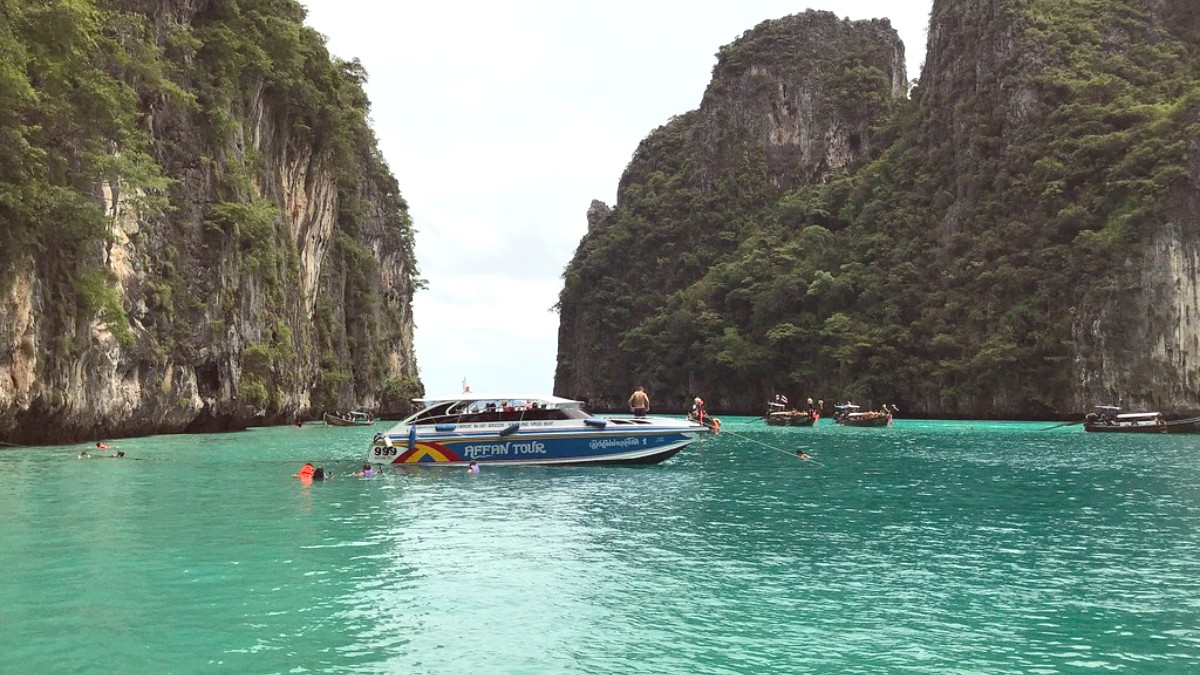
Andaman Coast, Thailand
Phuket Town experiences a tropical monsoon climate with distinct wet and dry seasons, a factor in your visit experience. The dry season (November to February) offers the most pleasant weather, with temperatures between 25-32°C (77-90°F), lower humidity, minimal rainfall, clear skies, and calm seas. This is peak tourist season for good reason; conditions are ideal for exploring the town and enjoying island excursions.
The hot season (March to May) sees temperatures rise to 28-36°C (82-97°F), with noticeable humidity. Occasional brief thunderstorms might occur, especially towards May. The heat can feel intense, especially at midday, making shaded activities or indoor exploration more appealing. The monsoon or wet season (May to October) has warm temperatures, typically between 24-32°C (75-90°F), and high humidity. Expect heavy, short-lived downpours, often in the late afternoon, with periods of sunshine in between. September and October generally receive the most rainfall. Despite the rain, the island remains lush and green, and sunny periods still occur.
For beach activities and island hopping, November to April offers the best sea conditions and sunniest skies. Diving and snorkeling visibility peaks from November to April, with world-renowned sites like the Similan and Surin Islands best from January to March (closed May to October for marine regeneration).
Phuket Town's cultural sites are enjoyable year-round, but the dry season provides more comfortable walking conditions due to lower humidity. For hiking and waterfalls, November and December, after the monsoon, are ideal when waterfalls are fuller and landscapes are verdant. During the shoulder or wet seasons, a lightweight, quick-drying umbrella or a compact rain jacket offers protection from sudden downpours.
notes on unique weather patterns.
Heavy monsoon rains lead to localized flooding, especially during prolonged downpours or in low-lying areas. Roads may become slick.
This region does not experience hurricanes. Tropical storms are rare and less severe, but they bring strong winds and heavy rain if they occur.
November - February
Excellent weather. Calm seas for all outdoor activities. Lower humidity. Peak visibility for diving.
Highest prices for flights and accommodation. Largest crowds at attractions and beaches. Book popular hotels and tours well in advance.
May - September
Lowest prices for flights and accommodation. Fewest crowds at attractions. Good travel deals.
Frequent rainfall. Seas can become rough, potentially disrupting or canceling island tours. Some smaller establishments may have reduced hours or close temporarily.
This period presents good weather with less frequent, but possible, rain showers. Crowds are fewer compared to the high season. You often find better prices for flights and accommodation. Sea conditions generally remain suitable for most activities.
March and April can feel very hot due to rising temperatures and humidity. October marks the transition to the dry season, rainfall increases, though not as consistently heavy as in peak monsoon months.
Good mix of sunshine and occasional showers.
More relaxed atmosphere compared to peak season.
Better deals on flights and lodging.
Generally suitable for most water activities.
March-April can be very warm and humid.
Entry requirements for Thailand vary based on your nationality and planned length of stay.
Thailand offers various entry options for tourists. Always check the website of the Royal Thai Embassy or Consulate in your country of residence for specific requirements, as rules can vary and change. Start the process well before your planned departure date. For assistance with visa applications, consider IVisa or VisaHQ.
Have an airline ticket showing your confirmed departure from Thailand within your visa exemption period or visa validity. Immigration officers may request this. Also, a confirmed booking for accommodation (e.g., hotel reservation) is useful.
The official currency of Thailand is the Thai Baht (THB), symbolized by ฿. Coins come in 1, 2, 5, and 10 Baht. Banknotes are 20, 50, 100, 500, and 1000 Baht. Exchange booths are widely available in Phuket Town and at Phuket International Airport (HKT). Banks also offer exchange services. ATMs are prevalent. For favorable rates, avoid exchanging large sums at the airport; rates are often better in town. Inform your bank of travel plans to prevent card issues. Sun protection is always a good idea.
Phuket Town is generally safe for tourists. Apply common sense precautions as you would in any unfamiliar urban area.
Traveler's Diarrhea: Drink bottled or purified water. Avoid ice cubes unless from purified water. Eat hot, cooked food. Wash hands frequently or use Hand sanitizer.
Mosquito-borne Diseases (Dengue, Chikungunya, Zika): Present, especially in wet season. Use OFF! Deep Woods Insect Repellent, 25% DEET. Wear long sleeves/pants, especially at dawn/dusk. Stay in accommodations with screens or nets.
Phuket offers good medical facilities. International-standard hospitals like Bangkok Hospital Phuket and Phuket International Hospital (Siriroj Hospital) are available but can be expensive, often requiring upfront payment. Pharmacies are widely available and can offer basic advice and OTC medications.
International hospitals for quality care.
Costlier, may require upfront payment or insurance guarantee.
Petty crime like pickpocketing and bag snatching can occur in crowded areas. Keep valuables secure. Be wary of common scams: inflated taxi fares, jet-ski scams (blaming tourists for pre-existing damage), and gem scams (overpriced, low-quality gems). Exercise caution.
Generally safe for tourists; common sense precautions apply.
Motorbike accidents are common; always wear a Helmet and have proper license/insurance.
Phuket is in a tsunami-prone region. Warning systems are in place, and coastal hotels have evacuation plans. Phuket Town is inland, so direct tsunami risk is minimal. Heavy monsoon rains can cause localized flash flooding, especially in low-lying areas, temporarily impacting mobility.
Tsunami warning systems are active in coastal areas.
Routes to/from coastal areas might be affected by tsunamis.
| Service | Number | Notes |
|---|---|---|
| Police (General) | 191 | General emergencies |
| Tourist Police | 1155 | English-speaking available |
| Ambulance/Medical | 1669 | Medical emergencies |